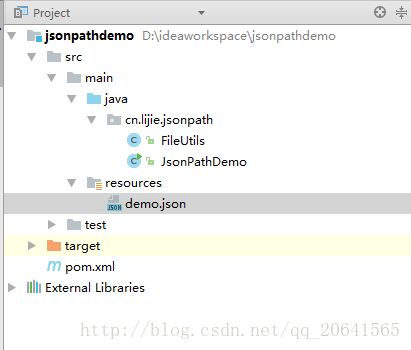json解析神器 jsonpath的使用
如果项目需求是从某些复杂的json里面取值进行计算,用jsonpath+IK(ik-expression)来处理十分方便,jsonpath用来取json里面的值然后用IK自带的函数进行计算,如果是特殊的计算那就自定义IK方法搞定,配置化很方便.
下面简单介绍下jsonpath的使用方法,主要测试都在JsonPathDemo类里面:
下面是一个简单的java项目demo:
注意: 其中他的max,min,avg,stddev函数只能类似于如下处理:
//正确写法 但是感觉很鸡肋
context.read("$.avg($.result.records[0].loan_type,$.result.records[1].loan_type,$.result.records[2].loan_type)");不能传入list 感觉比较鸡肋,如果传入list 他会报错(如下错误写法):
//这样会报错
Object maxV = context.read("$.max($.result.records[*].loan_type)");
//这样也会报错
Object maxV = context.read("$.result.records[*].loan_type.max()");
//如果json文件中是这样:"loan_type":"2",也会报错,"loan_type":2 这样才被认为是数字报错信息都一样,如下:
Exception in thread "main" com.jayway.jsonpath.JsonPathException: Aggregation function attempted to calculate value using empty arrayJsonPathDemo是一个测试demo:
public class JsonPathDemo {
public static void main(String[] args) {
String json = FileUtils.readFileByLines("demo.json");
ReadContext context = JsonPath.parse(json);
//1 返回所有name
List names = context.read("$.result.records[*].name");
//["张三","李四","王五"]
System.out.println(names);
//2 返回所有数组的值
List> objs = context.read("$.result.records[*]");
//[{"name":"张三","pid":"500234199212121212","mobile":"18623456789","applied_at":"3","confirmed_at":"5","confirm_type":"overdue","loan_type":"1","test":"mytest","all":"2"},{"name":"李四","pid":"500234199299999999","mobile":"13098765432","applied_at":"1","confirmed_at":"","confirm_type":"overdue","loan_type":"3","all":"3"},{"name":"王五","pid":"50023415464654659","mobile":"1706454894","applied_at":"-1","confirmed_at":"","confirm_type":"overdue","loan_type":"3"}]
System.out.println(objs);
//3 返回第一个的name
String name0 = context.read("$.result.records[0].name");
//张三
System.out.println(name0);
//4 返回下标为0 和 2 的数组值
List name0and2 = context.read("$.result.records[0,2].name");
//["张三","王五"]
System.out.println(name0and2);
//5 返回下标为0 到 下标为1的 的数组值 这里[0:2] 表示包含0 但是 不包含2
List name0to2 = context.read("$.result.records[0:2].name");
//["张三","李四"]
System.out.println(name0to2);
//6 返回数组的最后两个值
List lastTwoName = context.read("$.result.records[-2:].name");
//["李四","王五"]
System.out.println(lastTwoName);
//7 返回下标为1之后的所有数组值 包含下标为1的
List nameFromOne = context.read("$.result.records[1:].name");
//["李四","王五"]
System.out.println(nameFromOne);
//8 返回下标为3之前的所有数组值 不包含下标为3的
List nameEndTwo = context.read("$.result.records[:3].name");
//["张三","李四","王五"]
System.out.println(nameEndTwo);
//9 返回applied_at大于等于2的值
List> records = context.read("$.result.records[?(@.applied_at >= '2')]");
//[{"name":"张三","pid":"500234199212121212","mobile":"18623456789","applied_at":"3","confirmed_at":"5","confirm_type":"overdue","loan_type":"1","test":"mytest","all":"2"}]
System.out.println(records);
//10 返回name等于李四的值
List> records0 = context.read("$.result.records[?(@.name == '李四')]");
//[{"name":"李四","pid":"500234199299999999","mobile":"13098765432","applied_at":"1","confirmed_at":"","confirm_type":"overdue","loan_type":"3"}]
System.out.println(records0);
//11 返回有test属性的数组
List> records1 = context.read("$.result.records[?(@.test)]");
//[{"name":"张三","pid":"500234199212121212","mobile":"18623456789","applied_at":"3","confirmed_at":"5","confirm_type":"overdue","loan_type":"1","test":"mytest","all":"2"}]
System.out.println(records1);
//12 返回有test属性的数组
List list = context.read("$..all");
//["1","4","2","3"]
System.out.println(list);
//12 以当前json的某个值为条件查询 这里ok为1 取出records数组中applied_at等于1的数组
List ok = context.read("$.result.records[?(@.applied_at == $['ok'])]");
//["1","4","2","3"]
System.out.println(ok);
//13 正则匹配
List regexName = context.read("$.result.records[?(@.pid =~ /.*999/i)]");
//[{"name":"李四","pid":"500234199299999999","mobile":"13098765432","applied_at":"1","confirmed_at":"","confirm_type":"overdue","loan_type":"3","all":"3"}]
System.out.println(regexName);
//14 多条件
List mobile = context.read("$.result.records[?(@.all == '2' || @.name == '李四' )].mobile");
//["18623456789","13098765432"]
System.out.println(mobile);
//14 查询数组长度
Integer length01 = context.read("$.result.records.length()");
//3
System.out.println(length01);
//15 查询list里面每个对象长度
List length02 = context.read("$.result.records[?(@.all == '2' || @.name == '李四' )].length()");
//[9,8]
System.out.println(length02);
//16 最大值
Object maxV = context.read("$.max($.result.records[0].loan_type,$.result.records[1].loan_type,$.result.records[2].loan_type)");
//3.0
System.out.println(maxV);
//17 最小值
Object minV = context.read("$.min($.result.records[0].loan_type,$.result.records[1].loan_type,$.result.records[2].loan_type)");
//1.0
System.out.println(minV);
//18 平均值
double avgV = context.read("$.avg($.result.records[0].loan_type,$.result.records[1].loan_type,$.result.records[2].loan_type)");
//2.3333333333333335
System.out.println(avgV);
//19 标准差
double stddevV = context.read("$.stddev($.result.records[0].loan_type,$.result.records[1].loan_type,$.result.records[2].loan_type)");
//0.9428090415820636
System.out.println(stddevV);
//20 读取一个不存在的
String haha = context.read("$.result.haha");
//抛出异常
//Exception in thread "main" com.jayway.jsonpath.PathNotFoundException: No results for path: $['result']['haha']
//at com.jayway.jsonpath.internal.path.EvaluationContextImpl.getValue(EvaluationContextImpl.java:133)
//at com.jayway.jsonpath.JsonPath.read(JsonPath.java:187)
//at com.jayway.jsonpath.internal.JsonContext.read(JsonContext.java:102)
//at com.jayway.jsonpath.internal.JsonContext.read(JsonContext.java:89)
//at cn.lijie.jsonpath.JsonPathDemo.main(JsonPathDemo.java:58)
//at sun.reflect.NativeMethodAccessorImpl.invoke0(Native Method)
//at sun.reflect.NativeMethodAccessorImpl.invoke(NativeMethodAccessorImpl.java:62)
//at sun.reflect.DelegatingMethodAccessorImpl.invoke(DelegatingMethodAccessorImpl.java:43)
//at java.lang.reflect.Method.invoke(Method.java:498)
//at com.intellij.rt.execution.application.AppMain.main(AppMain.java:147)
System.out.println(haha);
}
} pom文件引入:
<dependency>
<groupId>com.jayway.jsonpathgroupId>
<artifactId>json-pathartifactId>
<version>2.3.0version>
dependency>其中demo.json是一个测试json:
{
"action": "/interface.service/xxx/queryBlackUserData",
"all": "1",
"result": {
"count": 2,
"tenant_count": 2,
"records": [
{
"name": "张三",
"pid": "500234199212121212",
"mobile": "18623456789",
"applied_at": "3",
"confirmed_at": "5",
"confirm_type": "overdue",
"loan_type": 1,
"test": "mytest",
"all": "2"
},
{
"name": "李四",
"pid": "500234199299999999",
"mobile": "13098765432",
"applied_at": "1",
"confirmed_at": "",
"confirm_type": "overdue",
"loan_type": 3,
"all": "3"
},
{
"name": "王五",
"pid": "50023415464654659",
"mobile": "1706454894",
"applied_at": "-1",
"confirmed_at": "",
"confirm_type": "overdue",
"loan_type": 3
}
],
"all": "4"
},
"code": 200,
"subtime": "1480495123550",
"status": "success",
"ok": 3
}FileUtils类是用于读取xx.json文件为字符串的json:
public class FileUtils {
/**
* 以行为单位读取文件,常用于读面向行的格式化文件
*/
public static String readFileByLines(String fileName) {
File file = new File(fileName);
BufferedReader reader = null;
String str = "";
try {
InputStream is = FileUtils.class.getClassLoader().getResourceAsStream(fileName);
reader = new BufferedReader(new InputStreamReader(is));
String tempString = null;
int line = 1;
// 一次读入一行,直到读入null为文件结束
while ((tempString = reader.readLine()) != null) {
// 显示行号
str += tempString;
}
reader.close();
} catch (IOException e) {
e.printStackTrace();
} finally {
if (reader != null) {
try {
reader.close();
} catch (IOException e1) {
}
}
}
return str;
}
}